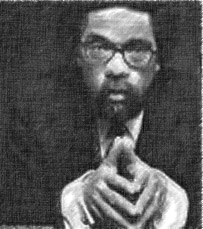Analyst: Patricia C. Lewis-West

Cornel West's Educational Theory
Analyst: Patricia C. Lewis-West |
 |
RETURN
edited 8/18/11
1. Theory of Value: What knowledge and skills are worthwhile learning? What are the goals of education?
Acquiring the knowledge and skills to combat efforts to dissolve the African American community. Nihilism exist in black communities and causes a loss of love and hope which can be the destruction of individuals. (C p. 15). West expresses nihilism as "the profound sense of psychological depression, personal worthlessness, and social despair widespread in Black America (B p. 135).2. Theory of Knowledge: What is knowledge? How is it different from belief? What is a mistake? What is a lie?
Understanding: Self, World and God (B p.418).3. Theory of Human Nature: What is a human being? How does it differ from other species? What are the limits of human potential?
Humans have the ability to share love, caring, and service to others (C p. 17).4. Theory of Learning: What is learning? How are skills and knowledge acquired?
Learning in school should give youth the ability to become free people by equiping children with the means to think and to stand on their own feet" (B p.322)5. Theory of Transmission: Who is to teach? By what methods? What will the curriculum be?
First and foremost parents, grandparents or caregivers. West speaks of H.F. Harlow's experiment with monkeys who were taken away from their parents. The monkeys were given artificial surrogates, a wire mesh "mommy", and a terrycloth "mommy". The monkeys did try to respond to the terry-cloth "mommy" by cuddling close. But, of course the cuddling was not reciprocated. The monkeys took on a "zombie" like state "they did not seem fully alive," even though they were supplied with all other necessary ingredients (water, food, safe environment) to sustain development (B p.338).6. Theory of Society: What is society? What institutions are involved in the educational process?
A collective effort involving the struggles of everyday life.7. Theory of Opportunity: Who is to be educated? Who is to be schooled?
A quality public education should be available to all without relationship to class or skin color (B p.321).8. Theory of Consensus: Why do people disagree? How is consensus achieved? Whose opinion takes precedence?
A struggle for power on overlapping terrain (B p.66).